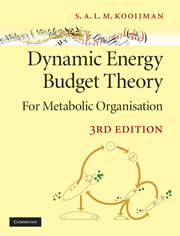Book contents
- Frontmatter
- Contents
- Preface
- 1 Basic concepts
- 2 Standard DEB model in time, length and energy
- 3 Energy, compounds and metabolism
- 4 Univariate DEB models
- 5 Multivariate DEB models
- 6 Effects of compounds on budgets
- 7 Extensions of DEB models
- 8 Covariation of parameter values
- 9 Living together
- 10 Evolution
- 11 Evaluation
- References
- Glossary
- Notation and symbols
- Taxonomic index
- Index
7 - Extensions of DEB models
Published online by Cambridge University Press: 05 June 2012
- Frontmatter
- Contents
- Preface
- 1 Basic concepts
- 2 Standard DEB model in time, length and energy
- 3 Energy, compounds and metabolism
- 4 Univariate DEB models
- 5 Multivariate DEB models
- 6 Effects of compounds on budgets
- 7 Extensions of DEB models
- 8 Covariation of parameter values
- 9 Living together
- 10 Evolution
- 11 Evaluation
- References
- Glossary
- Notation and symbols
- Taxonomic index
- Index
Summary
So far, the uni- and multivariate deb models have been kept as parameter-sparse as possible, with a strong focus on the slow processes that matter for the life cycle. For particular applications is it essential to include more detail, especially if shorter space and timescales need to be included. The purpose of this chapter is to discuss some of these extensions. Each section can be read independently, and deals with a problem that may have taxon-specific elements. Although the sections cover a range of topics, many important ones are painfully lacking, which only reflects that the theory is still in a stage of development. My hope is that it is possible to reduce the dazzling amount of seemingly complex eco-physiological phenomena to a small set of simple underlying principles that can be based on lower levels of organisation.
Handshaking protocols for SUs
If SUs are physically close to each other, they can interact. I discuss two types of interaction: that between an SU and a carrier and between SUs in a chain. This extension of the behaviour of SUS is applied later for the behaviour of metabolons in mitochondria, which perform the tca cycle, see {282}.
Handshaking protocols for carriers
Suppose that a substrate X is taken up from the environment by a Carrier (C), which passes its product Y to a Synthesising Unit (SU), which delivers its product Z to the rest of the metabolism of the cell, see Figure 7.1.
- Type
- Chapter
- Information
- Dynamic Energy Budget Theory for Metabolic Organisation , pp. 255 - 294Publisher: Cambridge University PressPrint publication year: 2009



